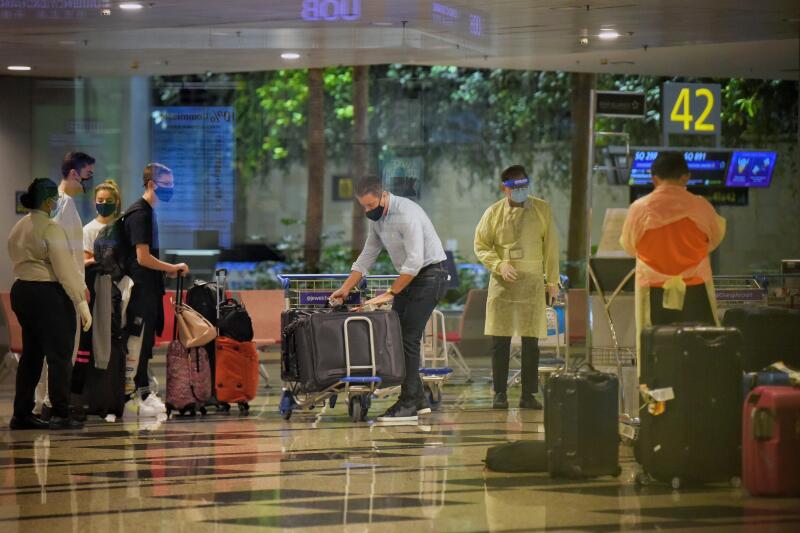Coronavirus Singapore
Rise in imported cases in Singapore to be expected, say experts
Figures reflect lifting of border curbs, point to success of screening measures
Sign up now: Get ST's newsletters delivered to your inbox

From Dec 15 last year to Jan 10, Singapore identified 562 imported cases from 31 different countries.
PHOTO: ST FILE
The rise in imported Covid-19 cases here is to be expected, experts said, adding that it is an indication of Singapore's lifting of border restrictions and the success of measures to screen out infections amid a rise in cases globally.
From Dec 15 to yesterday, Singapore identified 562 imported cases from 31 different countries. The number of daily cases was in the double digits, compared with the period between October and November when fewer than 10 imported cases were recorded daily.
Singapore had unilaterally lifted border restrictions since September, gradually allowing into the country visitors from Brunei, China, New Zealand, Vietnam, Australia and Taiwan.
This easing of restrictions was also extended to new work permit and S Pass applications across all sectors, to alleviate the manpower shortage faced by businesses.
Associate Professor Josip Car, director of the Centre for Population Health Sciences at Nanyang Technological University's Lee Kong Chian School of Medicine, said the rise is expected, "given the intensification of the Covid-19 disease globally, especially with the discovery of the new and highly transmissible strain of the virus".
Case numbers are surging in many of the countries of origin of those arriving here, said Professor Dale Fisher, who is from the Department of Medicine at the National University of Singapore's (NUS) Yong Loo Lin School of Medicine.
For example, Britain saw 417,620 people test positive from Jan 3 to 9, 75,674 more than in the previous week. Britain has been the third-largest source of imported cases since Dec 15, with 32 travellers testing positive.
Prof Fisher, who is also chair of the World Health Organisation's Global Outbreak Alert and Response Network, said many of those from high-prevalence countries will test positive during their 14-day stay-home notice in Singapore.
The number placed on stay-home notice, which includes almost all travellers, rose to 16,695 on Dec 15, up from 14,805 on Nov 15.
But the proportion of those on stay-home notice testing positive for Covid-19 has remained low.

For instance, Singapore saw 35 imported cases on Jan 3, or 0.2 per cent of the 18,426 people on stay-home notice at that point.
Prof Car added that the higher number is "a good sign that our detection measures are successful in screening out infected cases, given that community spread is still low".
Associate Professor Alex Cook of the NUS Saw Swee Hock School of Public Health said he is not concerned.
"Unlike the first quarter of last year, travellers from high-risk source countries are subject to hotel-based quarantine, which substantially reduces the risk of spillover.
"Since August, we've seen consistent levels of imported cases but hardly any community cases. That suggests the current quarantine regime is working," added Prof Cook, the vice-dean of research and domain leader of biostatistics and modelling at the school.
The experts said the number of imported cases is unlikely to fall unless the rate of transmission overseas does, or Singapore reduces its number of arrivals.
However, Prof Fisher pointed out that people travelling here do so for important social or business reasons, and the vast majority of them do not have Covid-19.
He added: "We are asking a lot from our hotels and they should be commended for their contribution to Singapore's response to Covid-19. They are performing tasks far beyond what they are designed for. And because of their efforts, travel is enabled (and) the healthcare system will not be overwhelmed by imported cases."
Prof Cook said that even if a few infected travellers are missed, their potential impact can be "mopped up" by the safe management measures in place in the community.
He added that the slight uptick in community cases is the result of the country gradually opening up.
"Phase three is characterised by greater normalcy than phase two, which of course means the risk of transmission is higher. We believe this can be countered by the safe management measures that we have in place now, though time will tell whether the balance is still right," he said.
Prof Car said Singapore should next look to getting the vaccination regime in place while maintaining responsible behaviour to curtail possible transmissions.
"With growing numbers of people being vaccinated, the world is hoping to prevent serious infections and eventually reduce the risk of a worsening outbreak," he added.


